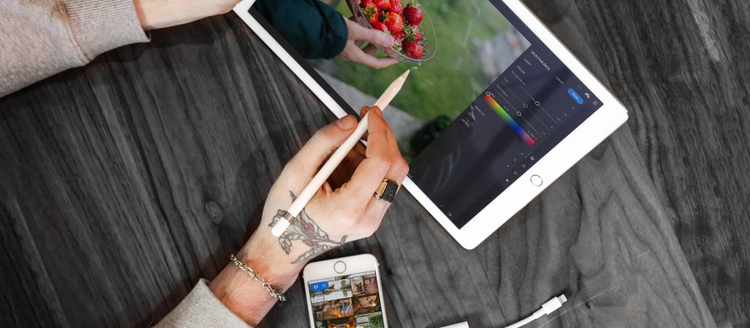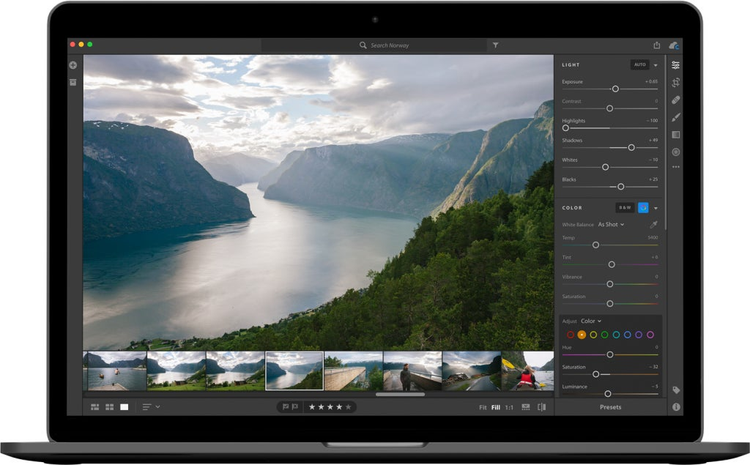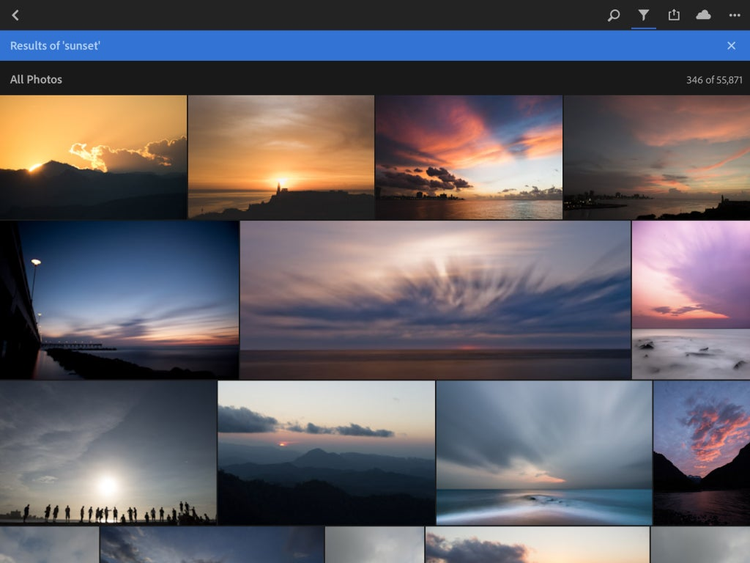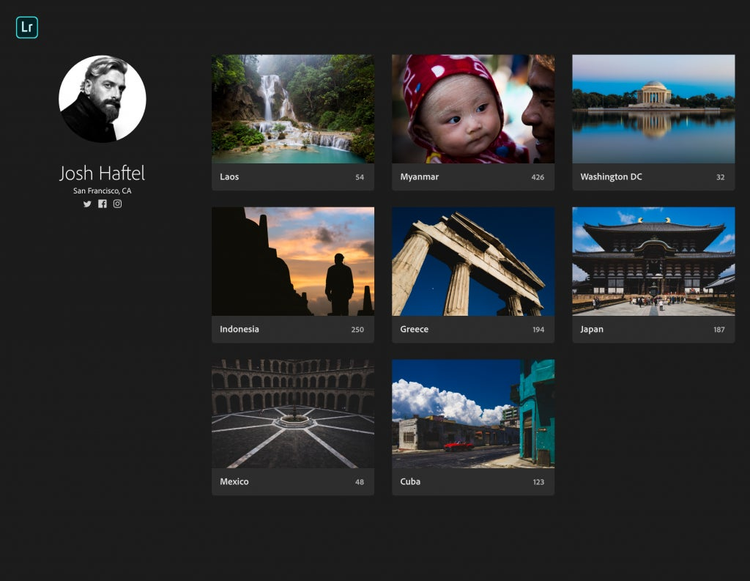Introducing: Lightroom CC, Lightroom Classic CC and More

Today we introduced our brand new Lightroom CC on Mac/Win, and updates to Lightroom Classic CC, Lightroom on iOS and Android, Lightroom.adobe.com, as well as changes to the existing Creative Cloud Photography plan and a new Lightroom CC plan.
Not seeing Lightroom CC in the Creative Cloud desktop app? Sign out and sign back in to the Creative Cloud app to refresh available application updates.
What’s the Difference Between Lightroom and Lightroom Classic?
Going forward, the product you’ve known as Lightroom will be rebranded “Lightroom Classic CC”. Why change? We have introduced a new photography service that will now be called “Lightroom CC”. It is designed to be a cloud-based ecosystem of apps that are deeply integrated and work together seamlessly across desktop, mobile, and web. Lightroom Classic CC is designed for desktop-based (file/folder) digital photography workflows. It’s a well-established workflow solution that is distinct and separate from our new cloud-native service. By separating the two products, we’re allowing Lightroom Classic to focus on the strengths of a file/folder based workflow that many of you enjoy today, while Lightroom CC addresses the cloud/mobile-oriented workflow.
What’s New in Lightroom Classic CC
As many of our customers know, Lightroom Classic (originally Lightroom) was born to help you manage your photography workflows and bring your images to life with a fleet of editing capabilities. But while the palette of Lightroom features grew, our performance detracted from these gains. So we took stock of where you were feeling the most performance anxieties, and dedicated this launch primarily to addressing these issues. The concerns that we gathered primarily centered around optimizing Lightroom Classic’s import and editing workflows.
Here are some of the highlights of where we have made gains that we have tested internally and are betting you will see:
- Application launch time
- Preview generation including in Standard, 1:1 and Minimal previews
- Import selection workflow with “Embedded & Sidecar” preview option (tips here)
- Switching between Library and Develop Module
- Moving from photo to photo in the Develop Module
- Responsive brushing
For a complete listing of “What’s New” in Lightroom Classic, click here.
We have also added new tools to make precise color and tone-based selections for Local Adjustments. You can now use the adjustment brush, radial, or graduated filters to define a rough mask, then refine the selection via the new Range Masking options found at the bottom of each Local Adjustment panel. This serves as a nice complement to meet your masking needs with the already existing auto mask feature in place.
Precise Selections with New Range Masking Tools
Check out some best practices here…and some useful video tips here.
While it was no small feat to carve out the foundation of making these performance gains, we know we still have a lot of work ahead. . For instance, we are working to optimize the performance of higher powered processing systems and higher resolution monitors. At the same time, we will continue to provide new image editing features that will help you pack more of a punch in a shorter period of time so that you can focus on what you love to do—taking incredible, awe-inspiring images.
What’s New in the Lightroom CC Ecosystem
Introducing Lightroom CC
The Lightroom CC ecosystem is a cloud-based service with three device-based apps: desktop, mobile and web.
Lightroom CC is designed and built around 3 guiding principles:
- Powerful Yet Simple—Lightroom CC will offer the powerful image editing that you want, while being simple and intuitive to use. Our goal is that it will have everything you need and nothing you don’t.
- Seamless experience across all your devices—Lightroom CC will work the same across desktop, mobile, and web. This allows you to move across your devices without needing to relearn or figure things out. Your photos and edits are all where you’d expect them to be.
- Cloud Based—Everything you do in Lightroom CC is synced to the cloud. This means that you can access and work with your photos from any device (including multiple computers), and can easily share photos with others. All of your photos and all of the work that you do with them will be automatically backed up all the time.
See here for useful video tips, and here for Lightroom CC FAQs.
Lightroom CC on Desktop (Mac/Win)
http://blogs.adobe.com/photoshop/files/2017/10/Adobe_LightroomCC_MacPro_sld6.png

Lightroom CC on desktop is a completely new app for Mac and Win. Lightroom CC is designed from the ground up to focus on photographers’ needs as they move between their devices and tap into the power of a cloud-based photo workflow.
Lightroom CC features a new interface that makes it easy to organize AND edit from the same streamlined experience. Your original images, edits, and metadata is synced and stored in the Creative Cloud. Once in the cloud, Lightroom CC taps into Adobe Sensei to automatically tag your images for search.
iOS and Android

http://blogs.adobe.com/photoshop/files/2017/10/IMG_0001.png
Lightroom CC on mobile devices got a number of important new features today as well, and fully supports the Lightroom CC ecosystem, while continuing to support Lightroom Classic.
Along with Lightroom CC on the desktop, both iOS and Android gain the ability to search through all of your synced photos, leveraging the power of Adobe Sensei to automatically tag and keyword your images for you. Now you can find photos you’re looking for by searching for what is in the photos. You can also now add keywords that will sync with all Lightroom CC devices, helping you find images with those specific keywords later. And to help you organize your images, Lightroom CC on both Android and iOS lets you create and manage your albums into folders, making it easier to keep track of all of your albums of photos.
In this release, Lightroom CC on iOS has also been optimized for iOS 11. We’ve added in the ability to import from and export to iOS 11’s Files app, making it possible to access any photo that’s available within Files. On iPads running iOS 11, you can now take advantage of Drag and Drop to import your photos, including raw photos, from any other app directly into Lightroom CC.
On Android, we’ve optimized the app for the latest version of Android OS, Android O. You’ll also now be able to selectively enhance your photos with the Selective Brush. And finally, the app has been optimized for Chromebooks, with a new interface that provides an optimal editing experience for devices with keyboards, as well as trackpads and touch interfaces.
Web

http://blogs.adobe.com/photoshop/files/2017/10/Haftel-Profile-Overview-Mockup@2x.png
Lightroom CC on the web continues to get more sharing tools, as well as a new Tech Preview.
The new Lightroom CC Gallery lets you add multiple albums to a single page that you can easily share with friends, family, and clients. Any images added into your albums will automatically show up in your gallery, and images will always reflect the latest edits, making it super simple to keep your gallery up to date.
For the past year, Lightroom CC on the web has offered a glimpse of new features and functionality coming to the Lightroom CC ecosystem, and today we’re excited to share yet another glimpse: Best Photos. The Best Photos tech preview stemmed from the desire to pick more quickly the best photos from a group without the long and sometimes monotonous task of sorting through a number of similar photos. Best Photos leverages a number of Adobe Sensei technologies to help automatically identify and group similar photos, pick the best photo from that group, and then select the best photos of each of the groups. This Tech Preview gives you a chance to play with some of the exciting new technologies that our researchers are working on and provide feedback on what you like, what you don’t like, and features that you’re wishing for.
TV
Rounding out the ecosystem, Lightroom for Apple TV was updated with a few new features to help make sharing your Lightroom photos in the comfort of your home even more enjoyable.
This update includes support for the latest tvOS’s dark mode, supports video playback within your albums, and lets you scroll through large collections of images even faster than before.
Lightroom 6
Lightroom 6 is the last standalone version of Lightroom that can be purchased outside of a Creative Cloud membership. There will not be a Lightroom 7 perpetual offering. Lightroom 6 will remain for sale for an undetermined amount of time, but will no longer be updated with camera support or bug fixes after the end of 2017. Lightroom 6.13 with support for the Nikon D850 will be released on October 26, 2017.